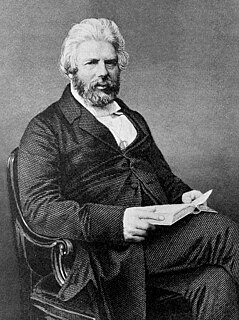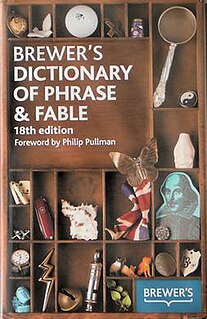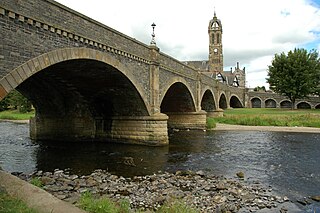
Robert Chambers was a Scottish publisher, geologist, evolutionary thinker, author and journal editor who, like his elder brother and business partner William Chambers, was highly influential in mid-19th century scientific and political circles.

Longman, commonly known as Pearson Longman, is a publishing company founded in London, England, in 1724 and is owned by Pearson PLC.

Merriam-Webster, Inc., is an American company that publishes reference books and is especially known for its dictionaries.

The Macquarie Dictionary is a dictionary of Australian English. It is generally held by universities and the legal profession to be the authoritative source on Australian English. It also pays considerable attention to New Zealand English. Originally it was a publishing project of Jacaranda Press, a Brisbane educational publisher, for which an editorial committee was formed, largely from the Linguistics department of Macquarie University in Sydney, Australia. It is now published by Macquarie Dictionary Publishers an imprint of Pan Macmillan Australia Pty Ltd. In October 2007 it moved its editorial office away from Macquarie University to the University of Sydney., and then later to the Pan Macmillan offices in the Sydney central business district.

Brewer's Dictionary of Phrase and Fable, sometimes referred to simply as Brewer's, is a reference work containing definitions and explanations of many famous phrases, allusions, and figures, whether historical or mythical.

In biological taxonomy, race is an informal rank in the taxonomic hierarchy, below the level of subspecies. It has been used as a higher rank than strain, with several strains making up one race. Various definitions exist. Races may be genetically distinct populations of individuals within the same species, or they may be defined in other ways, e.g. geographically, or physiologically. Genetic isolation between races is not complete, but genetic differences may have accumulated that are not (yet) sufficient to separate species. The term is recognized by some, but not governed by any, of the formal codes of biological nomenclature.

William Chambers of Glenormiston or William Chambers was a Scottish publisher and politician, the brother of Robert Chambers. The brothers were influential in the mid-19th century, in both scientific and political circles.
The Oxford-Hachette French to English/English to French Dictionary is one of the most comprehensive and recent bilingual French–English/English–French dictionaries. It was the first such dictionary to be written using a computerized corpus and it contains 555,000 translations as well as 360,000 words and expressions. The work was first published in 1994, with its second, third and fourth editions appearing in 1997, 2001 and 2007 respectively. Though the dictionary is entirely bilingual, it is marketed under two different names, one for French, one for English:
A slang dictionary is a reference book containing an alphabetical list of slang, which is vernacular vocabulary not generally acceptable in formal usage, usually including information given for each word, including meaning, pronunciation, and etymology. It can provide definitions on a range of slang from more mundane terms to obscure sexual practices. Such works also can include words and phrases arising from different dialects and argots, which may or may not have passed into more common usage. They can also track the changing meaning of the terms over time and space, as they migrate and mutate. This makes them of interest to a variety of people, from oral historians, to etymologists, to the casual browser.

The Collins-Robert French Dictionary is a bilingual dictionary of English and French derived from the Collins Word Web, an analytical linguistics database. As well as its primary function as a bilingual dictionary, it also contains usage guides for English and French, English and French verb tables, and maps of English and French speaking areas.
Chambers Biographical Dictionary provides concise descriptions of over 18,000 notable figures from Britain and the rest of the world. It was first published in 1897.
Harrap's Shorter French Dictionary, published by Chambers Harrap Publishers, is one of the best known English/French bilingual dictionaries in the United Kingdom and France. The eighth edition was published in April 2007. In the United States it is sold under the title Harrap's French and English College Dictionary.
Jonathon Green is an English lexicographer of slang and writer on the history of alternative cultures. Jonathon Green is often referred to as the English-speaking world's leading lexicographer of slang, and has even been described as 'The most acclaimed British lexicographer since Johnson'.
Chambers's Edinburgh Journal was a weekly 16-page magazine started by William Chambers in 1832. The first edition was dated 4 February 1832, and priced at one penny. Topics included history, religion, language, and science. William was soon joined as joint editor by his brother Robert, who wrote many of the articles for the early issues, and within a few years the journal had a circulation of 84,000. From 1847 to 1849 it was edited by William Henry Wills. In 1854 the title was changed to Chambers's Journal of Popular Literature, Science, and Art, and changed again to Chambers's Journal at the end of 1897.

David Patrick FRSE LLD was a Scottish writer and editor. He edited Chambers's Encyclopaedia from 1888 to 1892, Chambers's Biographical Dictionary in 1897 and Chambers's Cyclopaedia of English Literature with F. H. Groome from 1901 to 1903.
The Chambers Institution is home to the Tweeddale Museum and Gallery, a museum, library and art gallery at Peebles in the Scottish Borders area of Scotland.

Green's Dictionary of Slang (GDoS) is a multivolume dictionary defining and giving the history of English slang from around the Early Modern English period to the present day written by Jonathon Green. As a historical dictionary it covers not only slang words in use in the present day but also those from the past which are no longer used, and illustrates its definitions with quotations. It is thus comparable in method to the Oxford English Dictionary (OED) though with a narrower scope, since it includes only slang words; nonetheless it is more comprehensive within its scope, containing 125,000 items of slang while the OED has only 7,700 terms carrying a slang label.
















